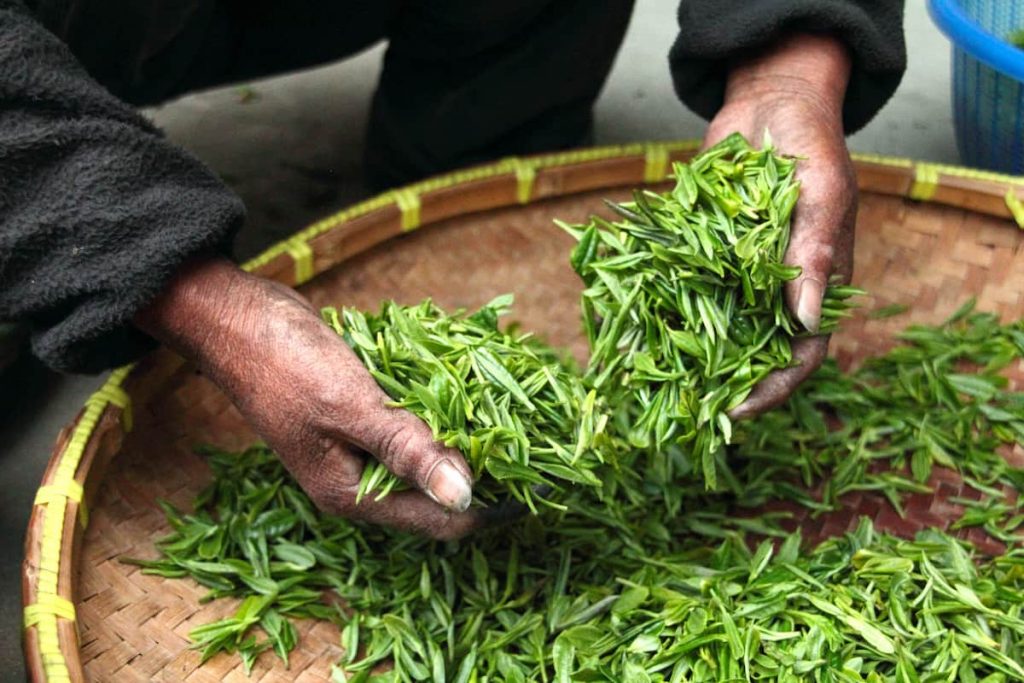Tea is not only a delicious drink, but it is also healthy for you. However, if you are wondering whether you can eat tea leaves, here you are to find the answer.
Contents
- 1 What Are Tea Leaves and Where Do They Come from?
- 2 What Are the Health Benefits of Eating Tea Leaves?
- 3 Are There Any Risks or Side Effects Associated with Eating Tea Leaves?
- 4 Can You Get the Same Health Benefits from Drinking Tea Instead of Eating the Leaves?
- 5 Who Should Not Eat Tea Leaves?
- 6 How Much Tea Should You Eat Each Day for Optimum Health Benefits?
- 7 Is Chewing Tea Leaves Good for You?
- 8 How Often Can I Eat Tea Leaves?
- 9 Can You Eat Tea Leaves After Steeping?
- 10 Can You Eat the Leaves of Green Tea?
- 11 Can Tea Leaves Go Off?
- 12 Can You Eat Tea Leaves for Caffeine?
- 13 FAQs on Can You Eat Tea Leaves?
- 14 Conclusion On Can You Eat Tea Leaves?
Can You Eat Tea Leaves?
Tea leaves can definitely be eaten. Many people don’t realize that tea leaves are edible and can be added to your diet. Tea leaves are a great source of antioxidants, which can help protect your body against disease. They are also a good source of fiber and vitamin C. Adding tea leaves to your diet can help improve your overall health.
 So next time you brew a cup of tea, don’t throw away the leaves – eat them instead! Let us see, the benefits of eating tea leaves, health concerns and much more.
So next time you brew a cup of tea, don’t throw away the leaves – eat them instead! Let us see, the benefits of eating tea leaves, health concerns and much more.
What Are Tea Leaves and Where Do They Come from?
Tea leaves are the leaves of the tea plant, Camellia sinensis. The tea plant is a member of the Camellia family, which also includes the plants that produce jasmine and osmanthus teas.
Tea plants are native to East Asia, and tea has been cultivated for centuries in countries like China, Japan, India, and Sri Lanka. Today, tea is grown in many other countries as well, including Kenya, Argentina, and Vietnam.
The type of tea that is produced depends on the climate and soil where the tea plant is grown, as well as the variety of tea plant that is used. For example, black teas and oolong teas come from plants that are grown in warm climates, while green teas come from plants that are grown in cooler climates.
What Are the Health Benefits of Eating Tea Leaves?
Drinking tea has been associated with a number of health benefits, including improved heart health, reduced stress levels, and increased alertness.
Some of the specific health benefits that have been linked to tea consumption include:
- Improved heart health: Tea contains antioxidants that can help reduce inflammation and lower cholesterol levels, both of which are risk factors for heart disease.
- Reduced stress levels: Tea has been shown to help reduce the body’s response to stress, and it has also been linked with lower rates of depression and anxiety.
- Increased alertness: The caffeine in tea can help increase alertness and focus, although it should be noted that green tea contains less caffeine than coffee.
- Improved brain function: Tea has been linked with improved memory and attention span, as well as a lower risk of dementia and Alzheimer’s disease.
- Cancer prevention: Some studies have suggested that tea consumption may help protect against certain types of cancer, including ovarian cancer and skin cancer.
While there are many health benefits associated with tea, it is important to remember that tea is not a magic cure-all. As with any food or beverage, moderation is key.
Are There Any Risks or Side Effects Associated with Eating Tea Leaves?
While there are many health benefits associated with drinking tea, there are also some risks to consider.
- One of the most common side effects of tea consumption is caffeine dependence. Tea leaves contain high levels of caffeine, which can lead to increased anxiety and restlessness.
- In addition, tea can also cause dehydration because it contains diuretic properties. This can lead to headaches, dizziness, and even nausea. It is important to stay hydrated when drinking tea, especially if you are susceptible to dehydration.
- Another risk to consider is that some teas contain high levels of fluoride. While fluoride is essential for dental health, too much can lead to skeletal fluorosis, a condition that weakens bones and joints. Therefore, it is important to moderate your intake of tea, especially if you are prone to bone or joint problems.
- Lastly, some teas contain oxalates, which can increase the risk of kidney stones. If you have a history of kidney stones, you should limit your consumption of tea.
Although there are some risks associated with tea consumption, moderation is key to enjoying a safe and healthy cup of tea.
Can You Get the Same Health Benefits from Drinking Tea Instead of Eating the Leaves?
While many people believe that tea leaves are the only source of health benefits, this is not necessarily true. In fact, research has shown that drinking tea can provide many of the same health benefits as eating the leaves.
For example, both green and black teas have been shown to improve heart health and reduce the risk of stroke. Additionally, both green and black teas have been shown to boost cognitive function and protect against Alzheimer’s disease. Finally, both green and black teas have been shown to promote weight loss by increasing metabolism.
As you can see, there are many benefits to be gained from drinking tea, regardless of whether or not you eat the leaves.
Who Should Not Eat Tea Leaves?
While tea leaves are safe for most people to consume, there are a few groups of people who should avoid eating them.
- Pregnant women or those who are trying to become pregnant should not eat tea leaves, as they can contain high levels of caffeine.
- Young children and the elderly should also avoid eating tea leaves, as their bodies may not be able to process the substances in the leaves effectively.
- Individuals with gastrointestinal issues such as heartburn or ulcers should also avoid consuming tea leaves, as they can irritate the digestive tract.
In general, tea leaves are safe for most people to consume, but it is best to err on the side of caution and avoid eating them if you fall into one of the above groups.
How Much Tea Should You Eat Each Day for Optimum Health Benefits?
Tea has been enjoyed for centuries and is renowned for its health benefits. According to recent research, the ideal amount of tea to consume each day is four cups. This quantity provides a significant boost to overall health, including improved brain function, weight loss, and reduced risk of heart disease and cancer.
Four cups of tea also contain the perfect amount of antioxidants to fight free radicals and protect cells from damage. In addition, it is a perfect quantity of tea a day to improve digestion and reduce inflammation. While four cups of tea offer the most benefit, even drinking one or two cups a day can have positive effects on health. Therefore, make sure to incorporate tea into your daily routine to enjoy all its benefits.
Is Chewing Tea Leaves Good for You?
There are many benefits to chewing tea leaves. Chewing tea leaves releases their antioxidants, vitamins, and minerals, which can help improve your oral health. The act of chewing also helps to increase saliva production, which can protect your teeth against cavities and gum disease.
Chewing tea leaves can also freshen your breath and improve your digestion. In addition, the antioxidants in tea leaves can help to boost your immune system and prevent chronic diseases. So, if you’re looking for a healthy way to improve your oral health and overall well-being, consider chewing tea leaves.
How Often Can I Eat Tea Leaves?
While there are many health benefits to be gained from drinking tea, you may be wondering how often you can safely consume tea leaves. According to some experts, up to 3 grams of tea leaves per day is considered safe for most people. However, it’s important to keep in mind that this is a general guideline, and your individual needs may vary depending on factors such as age, weight, and health condition.
If you have any concerns about consuming tea leaves, be sure to speak with your doctor or another healthcare professional. With moderate consumption, however, you can enjoy all the delicious flavor and health benefits that tea has to offer without worry.
Can You Eat Tea Leaves After Steeping?
Indeed! You can eat tea leaves after steeping! In fact, many people believe that eating steeped tea leaves is actually beneficial for your health. Tea leaves are loaded with antioxidants, which can help to protect your cells from damage and improve your overall health.
Additionally, tea leaves contain important minerals like iron and calcium. So, not only are they good for you, but they can also provide a valuable boost of nutrients. Just be sure to steep the leaves for the recommended amount of time to avoid bitterness. And if you’re not a fan of the taste, you can always add them to a smoothie or bake them into goodies like cookies or muffins.
Can You Eat the Leaves of Green Tea?
You may have heard that green tea is good for you, and you may have even seen people drinking it with leaves floating in the cup. But can you eat the leaves of green tea?
The answer is a definite yes! In fact, consuming green tea leaves is a great way to get even more of the health benefits associated with this popular beverage. Green tea leaves are rich in antioxidants, which can help to protect your cells from damage and promote good health. They also contain nutrients like vitamins C and E, as well as minerals like iron and calcium. So next time you’re enjoying a cup of green tea, don’t be afraid to eat the leaves!
Can Tea Leaves Go Off?
Just like any other food product, tea leaves can go bad. The primary causes of spoilage are oxidation and dehydration.
- Oxidation occurs when the leaves are exposed to air, causing them to turn brown and lose their flavor.
- Dehydration happens when the leaves are not stored in an airtight container, causing them to become dry and brittle.
Over time, these processes will make the tea leaves less enjoyable to drink. However, if the leaves are properly stored in a cool, dark place, they will stay fresh for up to a year. With proper care, you can enjoy your tea leaves for months to come.
Can You Eat Tea Leaves for Caffeine?
You can eat tea leaves for caffeine. Caffeine is a substance that is naturally found in plants, and tea leaves are no exception. In fact, consuming tea leaves is one of the most common ways to get caffeine.
When you steep tea leaves in hot water, the caffeine is released into the liquid, which you can then drink. Eating tea leaves is a bit different, but the caffeine is still present. Some people enjoy nibbling on dried tea leaves as a way to get a caffeine fix.
Others add tea leaves to smoothies or other recipes. While the amount of caffeine in tea leaves varies depending on the type of plant and growing conditions, generally speaking, you’ll get more caffeine from eating tea leaves than from drinking brewed tea. So if you’re looking for a quick caffeine boost, munching on some tea leaves may be the way to go.
FAQs on Can You Eat Tea Leaves?
Here are some commonly asked questions on topics relevant to whether you can eat tea leaves.
Are Tea Leaves Poisonous?
While it is true that some plants are poisonous if ingested, tea leaves are not among them. In fact, people have been safely consuming tea for centuries.
Tea leaves do contain certain compounds that can be toxic in high doses, but the amount of these compounds present in a cup of tea is far below the level that would cause any harm. So there is no need to worry about poisoning yourself with tea leaves. Just sit back, relax, and enjoy your cup of tea.
Can You Eat Tea Leaves from A Tea Bag?
You can definitely eat tea leaves from a tea bag! In fact, many people do just that – they add a few tea leaves to their salads, soups, and other dishes for a bit of extra flavour. While the leaves may not be as fresh as those you would get from loose tea, they are still perfectly safe to eat. Just be sure to check the ingredients list on the tea bag to make sure there are no added chemicals or flavors that you may not want to ingest.
Can You Ingest Tea Leaves?
While you might not want to eat a handful of dry tea leaves, there are actually many benefits to ingesting them. Tea leaves are a rich source of antioxidants, which can help to protect your cells from damage and improve your overall health.
In addition, tea leaves contain polyphenols, which have been shown to reduce the risk of heart disease and cancer. And if that’s not enough, tea leaves can also help to boost your metabolism and promote weight loss.
Can You Eat Dried Tea Leaves?
While most people only think of tea as a beverage, the truth is that dried tea leaves can be a versatile and healthy ingredient in many different dishes. Tea leaves are rich in antioxidants, which can help to protect against cell damage and boost immunity. They also contain polyphenols, which have been shown to reduce inflammation and improve heart health.
In addition, tea leaves are a good source of fiber, which can promote digestive health. When it comes to cooking with tea leaves, the sky is the limit. They can be used to make savory dishes like stir-fries or soups, or sweet treats like cakes or cookies. Best of all, they add a unique flavor that is sure to please any palate.
Conclusion On Can You Eat Tea Leaves?
Tea leaves offer a variety of health benefits and are a great way to improve your overall diet. However, it is important to be aware of the risks associated with eating tea leaves and to consult with a doctor before making any changes to your diet. Have you tried incorporating tea leaves into your diet? What has been your experience?










Add Comment